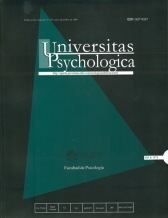Resumen
Se presenta un estudio cuyo objetivo general fue describir y evaluar la calidad de vida de pacientes con trasplante hepático en los últimos 15 años en Colombia. Participaron voluntariamente 25 trasplantados mediante firma de un consentimiento informado. La calidad de vida se evaluó con una entrevista semiestructurada previamente evaluada por tres expertos, que incluía ítems en formato de escala. La información se analizó con base en las categorías definidas a partir de la fundamentación teórica y la aplicación de pruebas estadísticas. Los resultados demostraron que el trasplante de hígado mejora marcadamente la calidad de vida de los pacientes en la etapa final de la enfermedad hepática, tanto en el aspecto psicológico como en el físico. También se encontró que la calidad de vida estuvo correlacionada de una forma importante con la independencia y con un incremento de la habilidad para el trabajo y, por consiguiente, con el reintegro a éste. Es evidente una mejora en su calidad de vida, en el bienestar general, en la recuperación de la habilidad para el trabajo y su reintegración psicosocial.Esta revista científica se encuentra registrada bajo la licencia Creative Commons Reconocimiento 4.0 Internacional. Por lo tanto, esta obra se puede reproducir, distribuir y comunicar públicamente en formato digital, siempre que se reconozca el nombre de los autores y a la Pontificia Universidad Javeriana. Se permite citar, adaptar, transformar, autoarchivar, republicar y crear a partir del material, para cualquier finalidad (incluso comercial), siempre que se reconozca adecuadamente la autoría, se proporcione un enlace a la obra original y se indique si se han realizado cambios. La Pontificia Universidad Javeriana no retiene los derechos sobre las obras publicadas y los contenidos son responsabilidad exclusiva de los autores, quienes conservan sus derechos morales, intelectuales, de privacidad y publicidad. El aval sobre la intervención de la obra (revisión, corrección de estilo, traducción, diagramación) y su posterior divulgación se otorga mediante una licencia de uso y no a través de una cesión de derechos, lo que representa que la revista y la Pontificia Universidad Javeriana se eximen de cualquier responsabilidad que se pueda derivar de una mala práctica ética por parte de los autores. En consecuencia de la protección brindada por la licencia de uso, la revista no se encuentra en la obligación de publicar retractaciones o modificar la información ya publicada, a no ser que la errata surja del proceso de gestión editorial. La publicación de contenidos en esta revista no representa regalías para los contribuyentes.


